Events Calendar
Current Weather
Spring in Algonquin Park
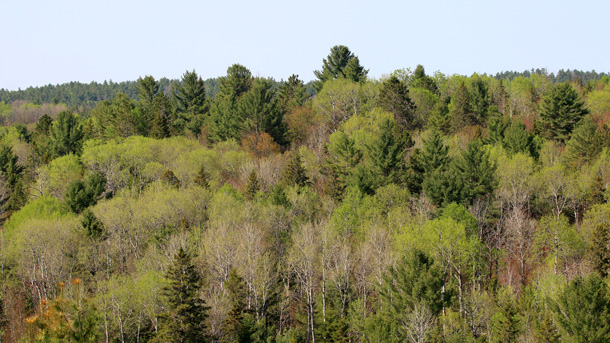
Always a Late Spring
 |
|||
 |
|||
Spring in Algonquin Park comes later than surrounding areas as a result of the Park's higher elevations. When snow and ice have left Toronto or Ottawa, conditions in Algonquin Park may still feel like winter. Check the current weather conditions in Algonquin Park. On average, ice on Algonquin's lakes remains until the last week of April or the first week of May.
- Live Views - Algonquin Park Webcam
- Ice Out Conditions - Images, Maps and Graphs
- Current Advisories for Park Visitors
- Algonquin's Weather and Climate
- Latest Images on Facebook
Moose Watching
Spring offers the year's best Moose viewing and you typically don't have to search very hard to see Moose. The application of salt to Highway 60 during winter road maintenance operations, attracts Moose to roadside ditches. Moose with salt deficient winter diets, capitalize upon this unnatural source of salt and chances are you'll see a half dozen or more of these magnificent animals during a leisurely drive along Highway 60 on a May morning or evening.
Moose (and other wildlife) pose a serious danger to drivers. Stay alert as Moose can be on the road or standing in roadside ditches and are often surprisingly hard to see. Each year Moose and other wildlife are killed in vehicle collisions. Reduce your speed (especially at night) and help save the lives of Algonquin Park's Moose and possibly even your own.
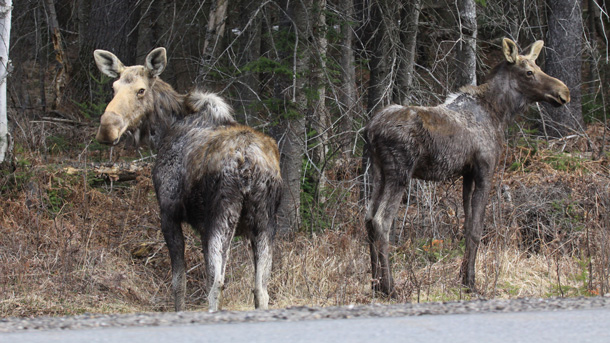
 If you see a Moose, pull onto the shoulder and off the traveled portion of the road and turn on your hazard lights to warn other drivers. If drivers flash their vehicle headlights at you in Algonquin Park, there's a good chance a Moose is ahead or maybe even a "Moose Jam" (a traffic jam caused by Moose watchers).
If you see a Moose, pull onto the shoulder and off the traveled portion of the road and turn on your hazard lights to warn other drivers. If drivers flash their vehicle headlights at you in Algonquin Park, there's a good chance a Moose is ahead or maybe even a "Moose Jam" (a traffic jam caused by Moose watchers).
If you exit the vehicle, watch for traffic and ensure you keep a safe distance from wildlife. If you are watching a Moose and it flattens its ears the length of its body (rather than ears pointing to the sky), you are too close and you should back up. Learn more about wildlife watching in Algonquin Park.
- Check The Friends of Algonquin Park's Facebook Page for spring Moose images and sightings.
Wildflowers and Leaf Out
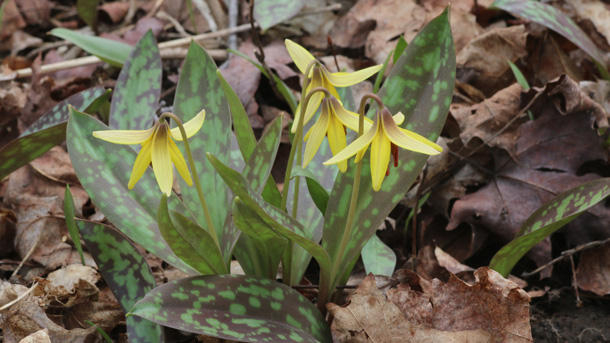
From late April into May, a select group of wildflowers called “spring ephemerals” grow and bloom in the brief window between the spring snow melt and leaf-out of the overhead canopy of trees. Once the canopy has filled in, very little light reaches the forest floor and many of these wildflowers go into dormancy until the next year, staying alive as a rootstock underground. Algonquin Park's interpretive walking trails are a great location to observe spring wildflowers.
During the first few weeks of May, take in the beauty and subtle hues of Algonquin's spring colours. Enjoy the pastel green of Trembling Aspen leaves, the pink wash of distant Red Maples, the white of cherry blossoms, and the silvery puffs of the Largetooth Aspen.
Biting Insects
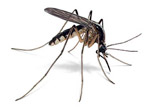 Spring is the time of blackflies and mosquitoes in Algonquin. Biting insects typically emerge in late-May and can remain abundant until late-June. In wet years, mosquitoes remain throughout the summer in shady wet areas and also emerge at dusk to feed. Learn how to prepare yourself against these biting insects so you can enjoy a spring visit to Algonquin.
Spring is the time of blackflies and mosquitoes in Algonquin. Biting insects typically emerge in late-May and can remain abundant until late-June. In wet years, mosquitoes remain throughout the summer in shady wet areas and also emerge at dusk to feed. Learn how to prepare yourself against these biting insects so you can enjoy a spring visit to Algonquin.
Trout Fishing - Special Fishery, Special Regulations
 Algonquin Park has some of the best Brook Trout and Lake Trout fishing in Ontario. In some years, anglers hoping to head into the backcountry for their first Brook Trout or Lake Trout fishing trip are delayed by iced lakes or impassible Access Point road conditions (e.g. deep snow, mud, washouts, etc.). Many anglers now delay their trip until a week or two after the opening of trout fishing season to ensure ice free conditions and easy access.
Algonquin Park has some of the best Brook Trout and Lake Trout fishing in Ontario. In some years, anglers hoping to head into the backcountry for their first Brook Trout or Lake Trout fishing trip are delayed by iced lakes or impassible Access Point road conditions (e.g. deep snow, mud, washouts, etc.). Many anglers now delay their trip until a week or two after the opening of trout fishing season to ensure ice free conditions and easy access.
Algonquin Park is a very special fishery and thus has special regulations to ensure the protection of the Park's fragile fisheries. If you will be fishing in Algonquin Park, ensure you are aware of the Park's special fisheries regulations including a ban on the possession (and use) of live baitfish.
School Visits
Teachers, clubs, and other groups may wish to take advantage of the Group Education Program offered through The Friends of Algonquin Park. Programs are available for all age groups and offered in half-day, full-day and sleepover formats and focus on the natural and cultural history of Algonquin Park.
Interpretive Walking Trails
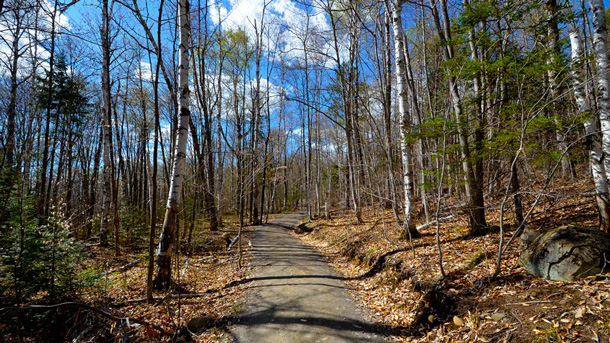
Algonquin Park's interpretive trails are open year-round, but there are some important differences for visitors who may be visiting during the early spring (April to mid-May).
- Depending upon the timing of your visit and the weather, trails conditions during the early spring can vary widely. Visitors should expect to encounter snow covered, ice covered, muddy, wet and even dry conditions all on the same trail from April to mid-May. Select the proper footwear and clothing for a variety of conditions and the weather forecast.
- Interpretive trails are often hard packed during the winter months from previous visitors wearing snowshoes. This compressed area is often slow to melt, so ice cleats may be a wise choice depending upon trail conditions.
- Trail guide booklets (containing trail maps) are removed from trailhead sign boards for the winter and early spring (late October to early/mid-May). If you are walking an interpretive trail, purchase trail guides in-person at the Visitor Centre, East Gate, West Gate or order them in advance online.
- Interpretive trails are not maintained by Ontario Parks during the winter months. This means during early spring visitors may encounter fallen trees and other hazards along the trail before crews have completed all maintenance operations.
- Some sections of trails may flood with the spring snow melt. Watch for closures on the Algonquin Park Advisories webpage. Never proceed on a flooded or closed trail.
- Following the blue circular trail markers indicates the correct direction on interpretive trails.
- Wear and pack the appropriate clothing, footwear, and equipment for the conditions. This should include additional clothing, water, snacks, a trail map, and a flashlight or headlamp.
- Cell phone coverage may be unavailable or limited on the trail of your choice.
- Let a friend or family member know where you are going and when you expect to return. Cell phone coverage exists at the beginning of most interpretive trails.
- Watch for specific trail closures and advisories.
- Walking Algonquin Park's interpretive trails during the early spring is an enjoyable experience for those who are prepared.
Opening Dates
Various Park facilities open at different times of the year to accommodate an increasing number of visitors during the spring/early summer season. See the Events Calendar for exact dates and times, but general opening dates are listed below.
Open or Opening Late April/Early May
The following facilities open in late April or early May. These include:
- Algonquin Park Visitor Centre (open year-round)
- Mew Lake Campground (open year-round)
- Interpretive Walking Trails (open year-round, see exceptions)
- Park Outfitters (various dates, click for more information)
- Developed Campgrounds
- Achray Campground (April 25)
- Kiosk Campground (April 25)
- Kiosk Ranger Cabin (April 25)
- Tea Lake Campground (April 25)
- Brent Campground (April 25)
- Brent Ranger Cabin (April 25)
- Brent Deputy Ranger Cabin (April 25)
- Backcountry Camping (May 2)
- Ranger Cabins (May 2) [Except for the Kiosk, Brent, and Brent Deputy Ranger Cabins]
- Backpacking Trails (May 2)
Opening for Mid-May
Many facilities open for the season just prior to the May long weekend. Please note that some campgrounds close after the May long weekend and reopen for early July.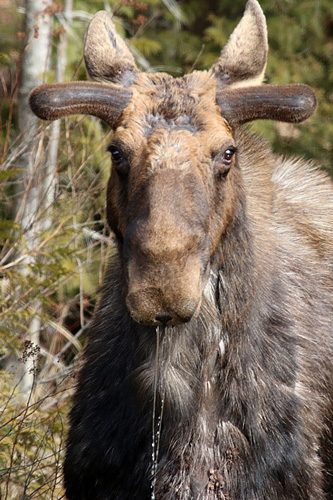
- Developed Campgrounds
- Canisbay Lake Campground (May 9)
- Lake of Two Rivers Campground (May 9)
- Raccoon (Coon) Lake Campground (May 9)
- Rock Lake Campground (May 9)
- Whitefish Lake Group Campground (May 9)
- Kearney Lake Campground (May 15)
- Pog Lake Campground (May 15)
- Park Lodges
- Bartlett Lodge (May 9)
- Killarney Lodge (May 9)
Opening for Mid-June
All Park facilities are typically open for mid-June. The final facilities to open are:
- Arowhon Pines Lodge (June 7)
- Algonquin Logging Museum (June 14 - reception building only, trail open year-round)
Spring Safety
Your safety in Algonquin Park – as elsewhere – is ultimately your responsibility. Be prepared!
A spring visit requires special care and attention. A last blast of winter can surprise unprepared visitors sometimes into May. Cold water in the first month or so of the open water season can be deadly. Use care with paddling on icy cold water.
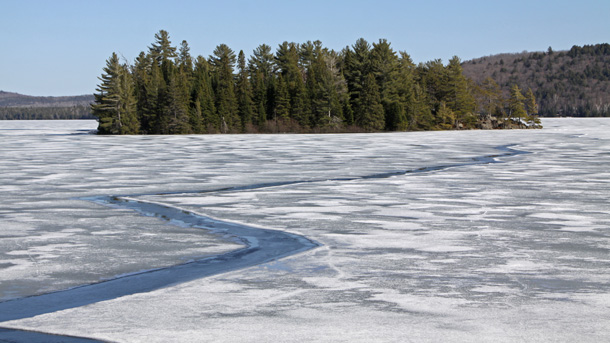
When using portages and interpretive trails, be cautious about fall trees, flooded conditions and other hazards and backcountry rangers or interpretive trail crews need time to clear winter hazards such as fallen trees blocking portages or trails.
As with other times of the year, cellular telephone coverage is not Park-wide; generally it is limited to 3 kilometres on each side of Highway 60 and, even in this area, service can be "none" to "limited."
Trip Planning Resources
- Canoe Routes Map - Explore Online
- Backpacking Map
- Fishing in Algonquin Park
- Petawawa River Whitewater Guide
- Madawaska and Opeongo River Whitewater Guide
Related Information
Reserve your developed or backcountry campsite for your next visit.
Share your passion for Algonquin Park by becoming a member or donor.
Special regulations for Algonquin's special fishery.









